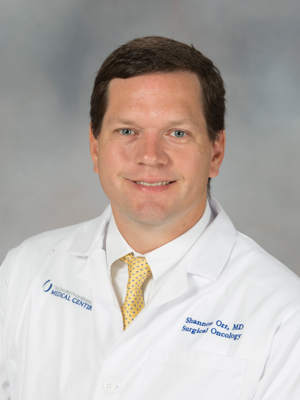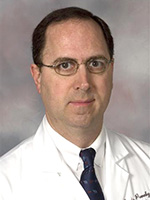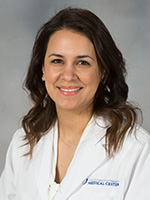Why colorectal cancer high-risk groups require early awareness
For the last six years, Mississippians throughout the state have worked to increase colorectal cancer screenings for those 50 and older, the group for whom screening is recommended by experts.
Now, doctors also are turning their attention to groups that may be younger and have increased risk factors for the disease.

“We know some groups of people are at higher risk for colorectal cancer and may need to be screened before they’re 50,” said Dr. Shannon Orr, UMMC associate professor of surgery and head of the University of Mississippi Medical Center Cancer Center and Research Institute Interdisciplinary Gastrointestinal Cancer Program.
Reaching out to those groups does not negate the need to encourage all state residents who are 50 and older to be screened, Orr said. Colorectal screening should begin at age 50 for those who are not at high risk: The American Cancer Society now recommends they get screened at age 45.
People at higher risk for colorectal cancer include those with:
* A family history of colorectal cancer. Having a parent, sibling or child with colorectal cancer doubles a person’s risk of colorectal cancer. Those in this group should begin screening at an age 10 years younger than that of the family member when he or she was first diagnosed with colon cancer.
* Inherited risk. This includes those with familial adenomatous polyposis (FAP) or hereditary nonpolyposis colon cancer (Lynch syndrome).
* Personal risk. This includes colorectal and ovarian cancer survivors, those who have had larger polyps with abnormal-looking cells removed and those with inflammatory bowel diseases such as Crohn’s disease or ulcerative colitis.
* African-American heritage. African-Americans have an increased risk of colon cancer and a higher risk of death from it. The risk increases even more if a first-degree relative is diagnosed with colorectal cancer.
Anyone in any of these groups should talk to his or her doctor about when to begin screening.
Records from the Mississippi Cancer Registry show colorectal cancer has been diagnosed in Mississippians of all ages, including some younger than 20 and some older than 85.
Researchers often look at the 40-49 age group, where colorectal cancer diagnoses are increasing. It is still lower than for those 55 and older, but symptoms of constipation, blood in the stool, cramping, bloating, abdominal pain and diarrhea often may be attributed to other factors in the younger group.
Finding colorectal cancer earlier gives doctors more treatment options, including newer medications, and increases chances of a cure, Orr said.
“One of the biggest advances in colorectal cancer has been the development of effective chemotherapy to treat the disease.” He said newer chemotherapies and targeted therapies that attack a tumor’s growth pathway may shrink the tumor, making it easier to remove surgically.
“We often see metastatic tumors in the liver shrink and then this allows us to remove them,” he said.
New surgical techniques make treatment easier on patients, Orr said.
“Many times we are able to remove the colon cancer robotically, and this allows the patients to spend less time in the hospital and recover faster,” he said.

Faster recovery also can be associated with earlier diagnosis, said Dr. Louis Puneky, UMMC professor of medicine and medical oncologist on the GI Cancer Program.
“Some people wait until they have symptoms,” Puneky said. “It’s more advanced colon cancer then.
“If caught in Stage 2, before the lymph nodes are involved, there’s an 80 percent chance of a surgical cure,” he said. Some people with high-risk cancers still would need chemotherapy after surgery.
Puneky encourages those younger than 50 who have consistent symptoms that are not going away to see a doctor. He said everyone should pay attention to relatives who may have had cancer.
“Colon cancer and other cancers can put you at higher risk,” he said.
Just as treatment has improved, so has the detection process. Screening, with colonoscopy or stool tests can prevent cancers and can detect malignancies earlier when treatment is more successful.
Colonoscopy, a procedure in which a gastroenterologist uses a scope to look at a person’s colon, allows physicians to remove polyps or small growths in the colon, and to take biopsies of suspicious-looking tissue.

“When we find polyps and remove them, we eliminate the potential for that polyp to turn into cancer in the future,” said Dr. Pegah Hosseini-Carrol, a UMMC assistant professor of medicine and gastroenterologist. She said many people dislike the bowel prep regimen before a colonoscopy, but patients now have many options, including some with popular flavors.
“Talk to your doctor about your concerns and he or she will help you choose the best prep for you,” Hosseini-Carrol said.
Most endoscopy procedures are done under monitored anesthesia with moderate sedation.
“Typically, patients have a very comfortable experience,” she said. After the procedure is over, most patients focus on what they’re going to eat.
Physicians consider colonoscopy the “Gold Standard” for colon cancer screening because it enables a doctor to remove polyps, take biopsies and sometimes even remove small cancers. Stool tests can highlight a potential problem that may require a colonoscopy.
Hosseini-Carroll said she has scoped patients at UMMC from a wide range of ages, from teenagers to the elderly. She urges people with symptoms to see their doctors and determine what is causing the symptoms, “no matter what your age.”
For more information about colon cancer screening, visit /Healthcare/Cancer/Cancer_Screening/Colorectal%20Cancer%20Screening%20and%20Diagnosis.html; to schedule a screening, call (601) 984-4540; to make an appointment with the GI Cancer team, call (601) 984-5590.
The above article appears in CONSULT, UMMC’s monthly e-newsletter sharing news about cutting-edge clinical and health science education advances and innovative biomedical research at the Medical Center and giving you tips and suggestions on how you and the people you love can live a healthier life. Click here and enter your email address to receive CONSULT free of charge. You may cancel at any time.



